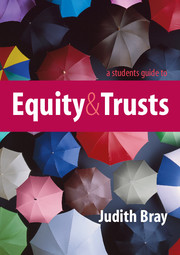Book contents
- Frontmatter
- Contents
- Preface
- 1 Historical introduction
- 2 Equitable remedies
- 3 The classification of trusts and powers
- 4 The three certainties
- 5 Constitution of trusts
- 6 Formalities for the creation of a trust
- 7 Private purpose trusts
- 8 Unincorporated associations
- 9 Resulting trusts
- 10 Constructive trusts
- 11 Trusts of the family home
- 12 Secret trusts and mutual wills
- 13 Charities; the Charities Act and the rules of cy près
- 14 Trustees: appointment, retirement and capacity
- 15 Duties and powers of trustees
- 16 Variation of trusts
- 17 Fiduciary duties and breach of fiduciary duties
- 18 Breach of trust and defences to breach of trust
- 19 Remedies against strangers to a trust
- 20 Tracing
- Index
13 - Charities; the Charities Act and the rules of cy près
- Frontmatter
- Contents
- Preface
- 1 Historical introduction
- 2 Equitable remedies
- 3 The classification of trusts and powers
- 4 The three certainties
- 5 Constitution of trusts
- 6 Formalities for the creation of a trust
- 7 Private purpose trusts
- 8 Unincorporated associations
- 9 Resulting trusts
- 10 Constructive trusts
- 11 Trusts of the family home
- 12 Secret trusts and mutual wills
- 13 Charities; the Charities Act and the rules of cy près
- 14 Trustees: appointment, retirement and capacity
- 15 Duties and powers of trustees
- 16 Variation of trusts
- 17 Fiduciary duties and breach of fiduciary duties
- 18 Breach of trust and defences to breach of trust
- 19 Remedies against strangers to a trust
- 20 Tracing
- Index
Summary
Key points
charitable trusts are different from private trusts;
charitable trusts must be exclusively charitable;
charitable trusts enjoy a number of advantages;
a charitable trust must satisfy certain requirements;
the definition of a charitable trust is laid down in the Charities Act 2006;
the definition of charity now comprises thirteen different heads of charity;
all charitable trusts must satisfy the public benefit requirement; and
if a charitable trust fails the funds may be transferred to another charity under the rules of cy près.
Introduction to charitable trusts
Charitable trusts are public trusts which carry a number of advantages. They are enforceable by the Attorney-General.
The advantages of charitable status
There are a number of advantages of having charitable status. Charities have always been regarded as beneficial to the public so the law has treated them in a more lenient way than private purpose trusts. The most significant of the advantages lie in the more lenient rules on taxation.
- Type
- Chapter
- Information
- A Student's Guide to Equity and Trusts , pp. 195 - 220Publisher: Cambridge University PressPrint publication year: 2012



